FILE – In this Oct. 9, 2009 file photo, Rep. Barney Frank, D-Mass., talks on the phone in his office on Capitol Hill in Washington before an interview with The Associated Press. Frank, who retired in January after a 40-year political career, including 32 in Congress, said Tuesday, April 3, 2013 that he has donated his personal papers to the University of Massachusetts Dartmouth. (AP Photo/Evan Vucci, File)
DARTMOUTH, Mass. (AP) — Retired U.S. Rep. Barney Frank has donated his personal papers to the University of Massachusetts Dartmouth, a gift that one school official called a “massive treasure trove.”
“I have come to very much appreciate the people, the life, the culture of southeastern Massachusetts and it’s an enthusiasm I want to continue to share,” Frank said during a ceremony Tuesday, explaining why he gave the more than 500 boxes of papers, artifacts and recordings to UMass rather than his alma mater, Harvard University.
Smaller public universities are critical to the future of the nation, he added.
“If universities like this do not prosper, then America will not be near what it should be,” Frank said.
The region remained one of his powerbases, along with his home town of Newton, throughout his tenure in Congress, he said.
Frank, who retired in January after a 40-year political career, including 32 in Congress, also agreed to give a lecture every semester at UMass Dartmouth.
The papers document the highlights of Frank’s career , including his leadership in legislation that allowed sweeping reforms in the country’s financial industry, gay rights, housing, immigration and the 9/11 terrorist attacks.
“He is truly a man of the people,” university Chancellor Divina Grossman said.
Terrance Burton, the dean of the UMass Dartmouth library, called the material a “massive treasure trove.”
History professor Mark Santow called the donation of Frank’s papers to the university a “major coup” that will draw scholars and researchers to the region to study Frank’s legacy, as well as history, economics, political science, business and policy studies.
The university plans to hire a full-time archivist to catalog the collection, a project expected to take three years.



